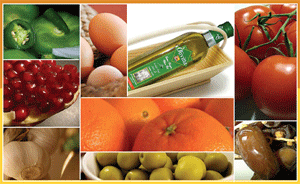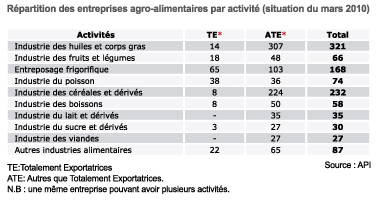Presentation of the FPI sector in Tunisia

Data on the FPI in Tunisia
A/ The Companies of the sector
The sector of Food-processing industries (FPI) counts up 1098 industrial companies employing 10 persons and more. Among them, 176 produce totally for export.

B/ Production and added value
For some years, the food-processing industry is witnessing a real dynamic and knows an important evolution to develop a diversified and successful industry.
The production value (the current price) has climbed from 5 712 MTND in 2002 to 9 927 MTND in 2008, registering an increase of about 74 %.
Furthermore, the added value (the market price) of the sector which was 941 MTND in 2002 went up to 1 680 MTND in 2009, that is an evolution of 78 %.
C/ The investments in the sector
The sector of the FPI represents more than 20 % of the industrial total of investments realized in 2008 that is 275 million dinars of investments, serving essentially to the upgrade of the sector.
These investments concerned, on one hand, the classic activities such as bakeries, oil works, freezing storage and the units of concentrated food for cattle and on the other hand the increase of capacities, processing of the tomato, the production of fizzy drinks, mineral waters, production of blue fishes cans and that of semolina storage and milk and its by-products.
D/ Jobs
The companies whose staff is upper or equal to 10 employ 63 603 persons among those companies 13 978 are totally exporting while 49 625 are not.
E/ The Exports
In 2009, the FPI sector represents 9,5 % of the total amount of exports in the country.
The exports of the sector rose from 1 471.1 million dinars in 2005 to 1 849,5 million dinars in 2008 then knew a regression in 2009 about 1 849,5 million dinars.
Italy is the first customer of Tunisia in terms of processed foodstuffs (42 % of the volume of the exports) followed by Spain (14 %) and of France (13 %).
D/ Upgrade of the food industries’ sector
The Ministry of Industry and Energy carried out studies on the main sector in a large number of streams, which stipulated:
-
An update of the evolution and the segmentation of the world market.
-
Estimate the strategic location of our products on markets.
-
Estimate the potential of the branch in Tunisia, and have a strategic vision on the threats and the opportunities of the branch.
-
Recommend a development strategy and propose an action plan for the promotion of the sector, to:
Then, strategies were adopted to boost sectors such as:
PRESENTATION OF the PFI SECTOR IN THE REGION OF SFAX
A/ The Companies of the sector
We count up 161 food-processing companies in Sfax (14.7% of companies FP in Tunisia) among which 26 are totally exporting with 16 specialized in fish industry (42.1 % in Tunisia), which represent 61.5 % of the totally exporting companies in Sfax.
B/ Production and added value
-
The poultry sector is witnessing a fast expansion with 50 % of laying hens, 15 % of the flesh chickens.
-
The dairy production is also in progress with an annual average production of about 84 million litres.
-
The fishing is a strategic activity for the local economy: modern harbour facilities; 8 fishing ports supplying with 20 000 tons that is 20 % of the national production, among which 10 000 tons are exported.
-
The governorate is renowned for its agricultural potential in particular oil and almond trees. Indeed, Sfax ranks first on the national scale with 40 % of the production of olive oil and 30 % of the production of almonds.
C/ Investments
-
Opportunities of investment
The economy of the governorate offers a wide range of crenels covering several branches of industry in particular:
D/ Jobs
The companies whose staff is upper or equal to 10 employ 6 116 persons. Among those companies 1549 are totally exporting and the rest 4 567 ones are partially exporting.
Distribution of the food-processing companies and the jobs in the units employing 10 persons and more
E/ The exports
The region of Sfax is the first exporter of olive oil with 60 % of the national exports.
The products of the sea present the first activity of export with 10 000 tons, that is 45 % of the national exports of the products of the sea. The olive oil is the second exported product, comes then the sea salt with 45 % of the national exports.
F/ Partnership:
The sector counts up 14 projects realized in partnership (foreign participation to the capital). The present main foreign brands in Sfax are: MAMIE-NOVA. etc..
Distribution of the projects realized in partnership according to activities and nationalities (Situation of 28/08/2004)
G/ Favourable environment and incitement set up for the development of the competitiveness of the sector of the food industries, in Tunisia and in particular in the region of Sfax
1.Specific advantages
Law N 93-120 carrying a promulgation of the code of incitement to the investments.
2. Specific advantages granted by the State in conformance with the regional development
-
For the delegations of Agareb, Djebeniana, El Amra, El Hanche, El Ghraiba and Skhira classified in regional development areas of the 1st Group:
-
remium of investment: 8 % of the global investment, the working capital excluded with a ceiling of 320 000 DT.
-
Premium in conformance with the participation of the State in the expenses of infrastructure: 25 % of amounts engaged by the company.
-
Coverage of the employer's contribution in the legal system of the Social Security ( CNSS): The coverage by the State of a share of this contribution during the first five years from the date of effective entrance in service fixed as follows:
-
For the delegations of Bir Ali Ben Khalifa and Menzel Chaker classified in regional development area of the 2nd Group:
-
Premium of investment: 15 % of the global investment, the working capital excluded with a ceiling of 600 000 DT.
-
Premium in conformance with the participation of the State in the expenses of infrastructure: 50 % of amounts engaged by the company.
-
Coverage by the employer's contribution in the legal system of the National Social Security Fund (CNSS): The coverage by the State of this contribution during the first five years from the date of effective entrance in service.
-
For the delegations of Kerkenah classified in priority regional development area
-
Premium of investment: 25 % of the global investment, the working capital excluded with a ceiling of 1.000.000 DT.
-
For the new promoters this premium is 30 %.
-
Premium in conformance with the participation of the State in the infrastructure expenses with: 75 % of the amounts engaged by the company.
-
Coverage by the employer's contribution in the legal system of the National Social Security Fund ( CNSS): The coverage by the State of this contribution during the first five years from the date of effective entrance in service and a share of this contribution during an additional period of five years fixed as follows:
|

